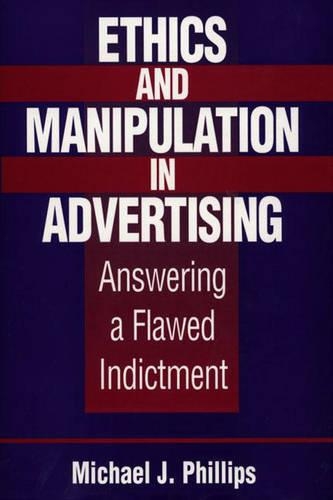
Ethics and Manipulation in Advertising: Answering a Flawed Indictment
(Hardback)
Publishing Details
Ethics and Manipulation in Advertising: Answering a Flawed Indictment
By (Author) Michael J. Phillips
Bloomsbury Publishing PLC
Praeger Publishers Inc
25th June 1997
United States
Classifications
Tertiary Education
Non Fiction
659.1042
Physical Properties
Hardback
224
Width 156mm, Height 235mm
454g
Description
For more than 50 years the critics of advertising have argued that advertising is bad because is manipulates, and that it must be reined in by political controls. Not so, argues Michael Phillips. If advertising really were as successfully manipulative as its critics claim, it almost certainly would be unethical and probably should be controlled - but it's not that effective. A growing body of empirical evidence now affirms that the enemies of advertising vastly overrate its power. Thus, the ethical case against manipulative advertising pretty much collapses, and with it goes much - if not all - of a statist political agenda that in Phillips's opinion is the real inspiration for the indictment. The argument that political controls are needed because advertising manipulates consumers is, for Phillips, a critique with a tacit assumption: that such manipulation is bad. Thus, he offers two chapters considering that assumption from the perspective of a business ethicist. He examines manipulative advertising under four ethical theories or values: utilitarianism, Kantian ethics, autonomy and virtue ethics. If it works as the critics say, manipulative advertising probably is unethical under most or all of these criteria. But does it really manipulate Does it stimulate the propensity to consume and dictate the brand and product choices consumers make Basing his conclusion on considerable empirical research, Phillips argues that advertising is not an especially strong force in these respects. For that reason, most of the ethical arguments against it deteriorate. This means, he says, that if capitalism's critics want to tout some new and better social order, they cannot use advertising's manipulativeness as an aid in doing so. On the other hand, nothing in the book necessarily blocks piecemeal attempts to regulate manipulative ads that do work and do cause some harm.
Reviews
Recommended for business and communications collections at the graduate and research level.-Choice
"Recommended for business and communications collections at the graduate and research level."-Choice
Author Bio
MICHAEL J. PHILLIPS is Professor of Business Law at Indiana University's School of Business. He holds a J.D. degree from Columbia University, and LL.M. and S.J.D. degrees from George Washington University. A former editor-in-chief of the American Business Law Journal, he has authored more than 40 scholarly articles and coauthored two business law texts. He is also author of The Dilemmas of Individualism: Status, Liberty, and American Constitutional Law (Greenwood, 1983).
